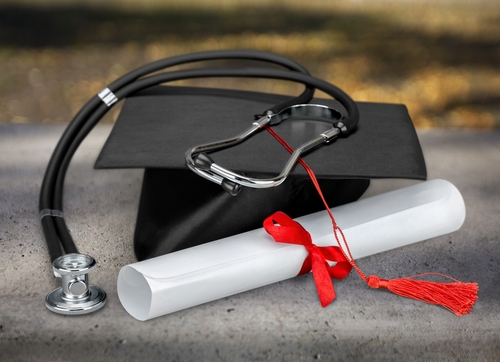
Going to medical school opens a wide range of career opportunities. It can lead to some of the most stable job choices available. But medical schools have high selectivity and competitiveness. They don’t accept everyone into their programs.
So, how do you get accepted to med school? You must complete all prerequisites before sending in your medical school application. A bachelor’s degree is great preparation for the rigor of medical school.
But what undergraduate degree is best for medical school? And what type of bachelor degree for medical school is necessary? Read on to discover the best degrees to get into med school.
–>
Biomedical Engineering
Today’s top doctors are more than healers. They’re also inventors and researchers.
Cardiologists create new devices for supporting the human heart. Orthopedic surgeons create new surgical techniques and artificial body parts. Pulmonologists create new types of inhalers and breathing machines.
An undergrad degree in biomedical engineering can lead you down this same path. It will give you the skills you need to invent and heal.
But biomedical engineering is a challenging field. It will prepare you for the rigor of medical school. It also overlaps with the prerequisite courses for admission to medical school.
Courses pre med students take in college
- Biology
- Chemistry
- Human physiology
- Organic Chemistry
- Statistics
Choosing a science-based major means choosing a community of peers. With this community comes many benefits, including:
- Dedicated learners
- Study groups
- Tutoring programs
Also, medical school admission committees understand the difficulty of this challenging major. They will weigh your GPA according to the rigor of your courses. For instance, a 3.5 out of 4.0 in biomedical engineering will impress them. A 3.7 in English or psychology might not as much.
Biology or Microbiology
Biology is the most traditional undergrad major for medical students pursuing health-related careers. Biology is the study of living things at three different levels:
- Cellular
- Organismal
- System
Courses you take as a biology or microbiology major
A major in biology will provide you with a broad understanding of many topics in biological sciences and health sciences. These topics include:
- Anatomy and physiology
- Cellular biology
- Ecology
- Genetics
This major introduces medical students to the theoretical concepts of the human body. It also helps you develop lab and research skills that are essential to medicine. You should have these skills if you want to attend medical school.
Most biology programs also offer internships. These count toward course credits and work experience. It will also help garner attention from medical school admissions committee officers.
One of the hardest challenges in medical school is the high-paced courses. U.S. schools don’t offer bachelor’s degrees in medicine programs. Instead, medical education occurs at the graduate level. Because of this, courses move fast, and students might fall behind.
But a bachelor’s in biology can prepare you for this rigor. It will give you a basic understanding of the field. You will be able to better absorb the advanced information in medical school classes. This is why biology is one of the best bachelor degrees for medical school.
Biology will also prepare you for the Medical College Admission Test (MCAT). Around 75% of the MCAT covers biological topics. So, biology majors have a head start in studying for the exam.
Chemistry or Biochemistry
There are many available bachelor degrees for med school. But only a few of them are the best.
A major in chemistry or a biochemistry degree is perfect for those pursuing health-related careers. The laboratory emphasis of chemistry prepares you for the medical field.
Skills you develop as a chemistry major
Medical students with a chemistry degree exhibit many skills, including:
- Critical thinking
- Effective problem-solving
- Working well with your hands
Medical schools respect students with the above skills. Those qualities are essential for students to enter medical school at American medical colleges and establish a medical career. Also, chemistry is among the hardest majors. So, some suggest only students with extreme passion for medicine choose chemistry.
Like biology, chemistry is a major component of the MCAT. Up to 50% of the MCAT covers chemistry or biochemistry.
Also, with a chem major, you get hands-on lab experience. This style of learning will give you knowledge you won’t find in a textbook.
Languages or Linguistics
Another best degree for medical school is linguistics. Speaking a second language is a great way to make your medical school application stand out. Fluency in many languages also allows you to communicate with patients. Otherwise, you might have to seek help from interpreters.
But fluency in many languages allows doctors to speak with patients without interpreters. This lessens the chance of miscommunication or misunderstanding. It also promotes strong relationships between you and your multicultural patients.
There is no language requirement for med school admissions. But you should consider the demographic of where you want to work. Then, you should learn the basics of the most common languages in that area.
For example, let’s say you want to practice medicine in Miami, California. A foundation in Spanish will help you communicate with many patients. And if you want to work in Minneapolis, Somali is the language for you.
Languages to study: 3 most common languages in the U.S.
- Chinese (including Cantonese, Mandarin, and other dialects)
- English
- Spanish
Also, succeeding in medical school takes lots of memorization. And most of this memorization consists of Latin names for medical terms and body parts. Previous experience with foreign languages will prepare students to grasp Latin quicker.
In fact, studying Romance languages like Spanish will quicken the process further. These languages have many Latin prefixes and suffixes. You will recognize Latin terms faster than those who didn’t study a Romance language. That’s why linguistics is one of the best undergraduate degrees for medical school.
Music or Performance
Though it may seem odd, music is one of the best degrees for med school. Music majors have among the highest acceptance rates into medical school. This is because medical school requires extensive prerequisite courses. And these courses are all on natural science.
Music majors must display dedication to take so many classes outside their major. Also, music takes a pursuit of perfection and hours of study. These qualities are also needed for medical students and practicing doctors.
A music degree tells admission committees that you are a dedicated person. So, students who love performing don’t have to choose one path. They find it’s possible to pursue both music and medical school.
Nursing and Allied Health
This medical degree provides knowledge in fields from anesthesia technology to radiation therapy. Students who pursue an allied health degree gain crucial experience in clinical practice. Some allied health majors even choose to work before going to med school. These students bring a great level of experience.
For example, you could be a respiratory therapist who becomes a pulmonologist. Your allied health experience will benefit you. You will bring a specialized understanding to other respiratory specialists.
Your experience can even influence your colleagues. You can pass on respiratory therapist techniques to other specialists. In turn, they can bring these techniques to patient care.
But there is a drawback to some allied health degrees. Those with training in occupational therapy might struggle to adjust to medical school. This is also true for other allied health topics.
The medical aspect of patient care can be overwhelming. Medical school requires advanced scientific coursework. But undergraduate program health coursework includes clinical experience. Allied health professionals might not have time to complete medical school requirements.
You must balance 40-hour clinical work weeks with advanced coursework. This might include working as a medical assistant and taking organic chemistry. Not everyone is capable of such a heavy workload.
How experience can get you into medical school
You can get into medical school when you have experience in:
- Audiology
- Massage therapy
- Nursing
- Other health professions
Osteopathic medicine schools often favor students with healthcare experience. They will overlook an imperfect GPA or MCAT score if you are an allied health professional. They understand test scores and grades aren’t everything. Sometimes experience means much more.
Psychology
Psychology majors are the second largest population in U.S. medical schools. This is why it’s considered the best undergraduate degree for medical school. It is second only to biology, which is the most popular med school degree.
Psychology is perfect for medical students pursuing careers in:
- Behavioral sciences
- Biological sciences
- Neurology
- Psychiatry
- Social sciences
Coursework psychology majors should take
We recommend that psychology majors take coursework in health and biological sciences. But psychology curriculum on its own gives you an understanding of:
- Behavior
- Body mechanisms
- Brain anatomy
Psychology will also give you an in-depth understanding of research procedures. You should plan to study the development of ethics in psychology. This will give you an appreciation of modern guidelines for research. You will also develop skills in study design and participant recruitment.
Also, psychology helps doctors provide better medical education to patients. Patients might use the internet or unprofessional medical advice. They do this instead of visiting a doctor. And it can lead to resistance around discussing medical needs with professionals.
An understanding of human psychology will help you communicate. That’s why some of the top sports medicine doctors have a pysch degree. You can convince patients to follow evidence-based treatments. Research studies find that patients who feel respected by their doctors:
- Accept recommendations for lifestyle changes
- Attend regular check-ups
- Take prescribed medication
Psychology is one of the best degrees for medical school. Medical school admissions committees favor students with this social sciences degree. It will also prepare you for patient/doctor communication.
A respected medical doctor is a great doctor. And the best way to gain respect is to form strong relationships with your patients.
Public Health
Public health is one of the best bachelor degrees for med school. Many medical experts today deal with more than individual patients. In fact, physicians often work in public health roles.
In these roles, you will focus on the health of many populations. Common roles for physicians include:
- Administrative positions in community hospitals
- Administrative positions in global health organizations
- Medical director of a non-profit clinic
- State surgeon general
Benefits for medical students with a public health degree
Also, this degree will allow you to repay student debts. Federal programs offer loan repayment for physicians working in underserved communities. This includes rural and Native American regions.
In underserved communities, medical professionals are rare. You must be able to serve patients with varying needs. A medical degree in public health will prepare you for this. You will learn to direct scarce resources and achieve the best outcome.
A public health foundation is crucial even for physicians outside the industry. This was especially true during the 2020 COVID-19 pandemic.
Patients must understand the importance of social distancing. They must also interpret data from local and federal government sources. With your health background, you can help them with this.
Physicians must remain as trusted sources of medical information. To do this, you have to understand health guidelines. This way you can guide patients toward the best health practices.
But most medical schools don’t offer public health courses. There is not enough space in medical school curriculum to accommodate them. So, it’s crucial for future doctors to study public health in undergraduate programs.
Best Minors for Medical School Admission
Minors are not needed for acceptance to medical school. But they can give you an advantage. Let’s look at some minor/major examples.
You might wish to pursue independent practice as a primary care physician. In this case, a minor in business or accounting will pay dividends. It will also show your long-term commitment to medicine.
By completing pre-requisite courses, you’ll come close to receiving science minors. This is why science-based minors are so popular among medical school applicants. You must take one or two high-level biological sciences courses to get a science minor.
Minors are also helpful for those wishing to pursue non-medical interests. For instance, you might take classes in English, fine arts, or history.
These types of minors don’t offer direct benefits for med school. But they do show a commitment to educational growth.
Also, you can use your minor(s) to combine personal passions with medicine. For instance, you could study the history of medical thought. Or you could explore literary portrayals of medical treatment. The possibilities are endless.
Our list includes the most common undergrad degrees for med school. But it’s important to remember that med schools focus on more than your major.
What medical school applicants should have
Medical schools require applicants have:
- Extracurricular activities
- Prior related internships or work experience
- Solid MCAT scores
- Strong grade point averages
Medical school stats
The Association of American Medical Colleges offers some insight into med school statistics. They describe the average GPA and MCAT score of accepted applicants:
- GPA of non-science majors: 3.66
- GPA of science majors: 3.44
- MCAT score: 28.3
These are solid scores that need undergraduate diligence. So, you should choose a degree program topic you excel at and that piques your interest. This will prevent burnout, which will lessen your chances of acceptance to med school. It will also ensure good grades and educational fulfillment.
BDP Staff
June 2022
Related:





